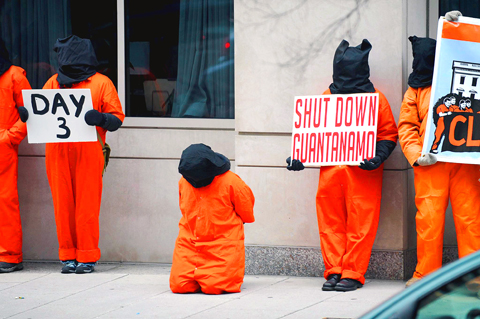US president-elect Barack Obama pounded home the need for fast action on huge spending plans to rescue the US economy in a meeting with lawmakers on Tuesday as he prepares to take office in a week.
Shifting roles from a politician seeking the presidency to a soon-to-be chief executive facing the country’s worst economic crisis nearly 80 years, Obama will be on a mission of gentle persuasion — and not so gentle arm-twisting as needed — among lawmakers who must approve use of the second half of the US$700 billion financial bailout fund.
Obama asked Democratic senators not to stand in the way of the additional US$350 billion in bailout funds, calling the money essential to helping the troubled economy. He made his pitch in a meeting on Tuesday in the Capitol, where he attended the Democratic senators’ closed-door luncheon.

PHOTO: AP
Lawmakers who emerged from the session said the president-elect pledged to correct what they believe were shortcomings in the way the administration of US President George W. Bush handled the first US$350 billion.
They added he would veto any attempt to block his own administration’s use of the funds.
Obama’s transition team prepared to dispatch top aides to meet Senate Republicans this week in anticipation of a possible vote today on whether to release the remainder of the money in the embattled rescue fund for the financial sector, called the Troubled Asset Relief Program (TARP).
The TARP relief measure was rushed through Congress in September as several major US financial institutions failed or were on the verge of collapse.
The flurry of activity comes in the wake of Bush’s decision on Monday to act on Obama’s behalf by asking Congress to release the remaining US$350 billion in the rescue package. The Bush administration’s use of the first half of the massive fund has been roundly criticized by lawmakers in both parties as unfocused, poorly accounted for and not transparent.
If the Senate approves release of the second half of the TARP fund, it would become available to Obama shortly after he takes office on Tuesday.
If he succeeds, Obama would have more than US$1.1 trillion at his disposal to tackle sinking employment and clogged credit within weeks of assuming the presidency.
Obama also is moving on a campaign pledge to close the Guantanamo Bay prison, preparing to issue an executive order in the first days of his administration on one of the most controversial developments of the Bush administration.
Two advisers on the Obama transition team, speaking anonymously because the plan was not yet public, said on Monday the order could be on the books as early as Obama’s first day in office.
The closing of Guantanamo at the US Navy base in Cuba was not expected to happen immediately or even soon after the Obama order.
In an interview last weekend, Obama said it would be “a challenge” to close it even within the first 100 days of his administration.

POLITICAL PATRIARCHS: Recent clashes between Thailand and Cambodia are driven by an escalating feud between rival political families, analysts say The dispute over Thailand and Cambodia’s contested border, which dates back more than a century to disagreements over colonial-era maps, has broken into conflict before. However, the most recent clashes, which erupted on Thursday, have been fueled by another factor: a bitter feud between two powerful political patriarchs. Cambodian Senate President and former prime minister Hun Sen, 72, and former Thai prime minister Thaksin Shinawatra, 76, were once such close friends that they reportedly called one another brothers. Hun Sen has, over the years, supported Thaksin’s family during their long-running power struggle with Thailand’s military. Thaksin and his sister Yingluck stayed

In the sweltering streets of Jakarta, buskers carry towering, hollow puppets and pass around a bucket for donations. Now, they fear becoming outlaws. City authorities said they would crack down on use of the sacred ondel-ondel puppets, which can stand as tall as a truck, and they are drafting legislation to remove what they view as a street nuisance. Performances featuring the puppets — originally used by Jakarta’s Betawi people to ward off evil spirits — would be allowed only at set events. The ban could leave many ondel-ondel buskers in Jakarta jobless. “I am confused and anxious. I fear getting raided or even

Kemal Ozdemir looked up at the bare peaks of Mount Cilo in Turkey’s Kurdish majority southeast. “There were glaciers 10 years ago,” he recalled under a cloudless sky. A mountain guide for 15 years, Ozdemir then turned toward the torrent carrying dozens of blocks of ice below a slope covered with grass and rocks — a sign of glacier loss being exacerbated by global warming. “You can see that there are quite a few pieces of glacier in the water right now ... the reason why the waterfalls flow lushly actually shows us how fast the ice is melting,” he said.

Residents across Japan’s Pacific coast yesterday rushed to higher ground as tsunami warnings following a massive earthquake off Russia’s far east resurfaced painful memories and lessons from the devastating 2011 earthquake and nuclear disaster. Television banners flashed “TSUNAMI! EVACUATE!” and similar warnings as most broadcasters cut regular programming to issue warnings and evacuation orders, as tsunami waves approached Japan’s shores. “Do not be glued to the screen. Evacuate now,” a news presenter at public broadcaster NHK shouted. The warnings resurfaced memories of the March 11, 2011, earthquake, when more than 15,000 people died after a magnitude 9 tremor triggered a massive tsunami that